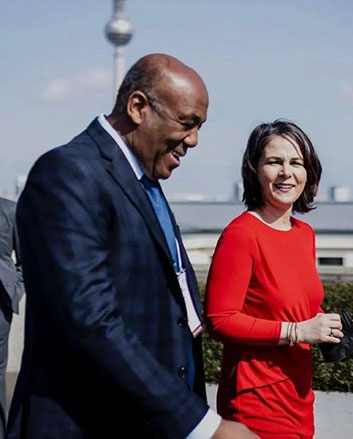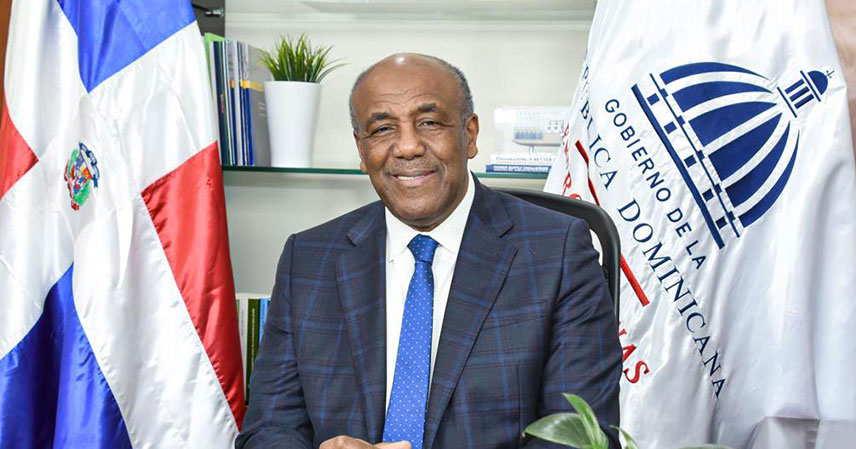Interview
‘We need new energy partnerships’
Minister Almonte, at the end of March you participated in the Berlin Energy Transition Dialogue. What did you take away from the conference?
The conference offered us a good opportunity to discuss political frameworks and the challenges of the international energy transition. Quite apart from the climate change aspect, rising gas and coal prices are making the matter all the more urgent for countries like the Dominican Republic. The Berlin Energy Transition Dialogue made it clear that we need new energy partnerships.

What goals has the Dominican Republic set itself in terms of expanding the use of renewables?
The original plan, which provided for renewables generating one quarter of our electricity by 2025, now seems difficult to achieve. The government that was elected in 2020 has had to modify the goals for the energy transition. Our new target is to raise the percentage of electricity generated from renewables to 30 per cent by 2030. Renewables currently account for about 20 per cent of our energy mix.
How do you plan to achieve that?
We are counting mainly on solar and wind power, although biomass and hydro-power will also be used. Last year alone, the new government entered into PPAs, power purchase agreements, with private power generators for electricity from new solar power projects with an installed capacity of 800 MW. This will double the installed capacity of major solar and wind projects, which along with smaller-scale photovoltaic plants currently generate a good 10 per cent of the electricity we need.
What are the greatest challenges of the energy transition in the Dominican Republic?
Financing is the greatest obstacle. Like other Caribbean countries we have in the past mainly used heavy fuel oil, which is very damaging to the environment, to generate power. The first step, over the last few years, has been to convert our power plants to run on natural gas. This allows us to reduce emissions while ensuring continued power supplies as we work to expand the use of renewables. Unfortunately development banks like the World Bank and the Inter-American Development Bank no longer offer loans for fossil fuel projects involving conversions to natural gas.

Do you also face obstacles in your efforts to expand the use of renewables?
Here too the greatest hurdle is financing, for large-scale projects and for expanding secure transmission grids. We currently have major energy losses within our grid. We urgently need to increase the efficiency of grid operators – partly to mitigate energy losses but equally because the state is subsidising the loss-making grid operators. We also need to develop the transmission network so that we can safely integrate power generated from renewables. And this too will mean major investment.
Secure energy supplies are a vitally important issue for the Dominican Republic. This is an area where you work with GIZ.
Cooperation with GIZ is extremely important to us, because renewables will play a major part in ensuring secure energy supplies in the long term. GIZ has a key role to play in developing capacities for the energy transition and is supporting us with technical studies so that we can make the right decisions. One issue is how we can feed power generated from wind and solar energy into the grid without compromising stability.
Many developing countries and emerging economies feel that they are not getting enough support from the industrialised nations to help them realise their national climate targets. Has this changed in any way since the UN Climate Change Conference in Glasgow in 2021?
Not much has changed for the Dominican Republic since Glasgow. Our main challenge remains the same. We still have no access to international funding to finance our conversion to natural gas. We need natural gas to bridge the gap and maintain power supplies for our growing economy during the energy transition.
Within the scope of the International Climate Initiative (IKI), GIZ is working on behalf of the Federal Ministry for the Environment, Nature Conservation, Nuclear Safety and Consumer Protection (BMUV) to help the Dominican Republic achieve its climate goals. We work closely with the Ministry of Energy and Mines and other partners from the Dominican energy sector to foster the use of renewables and reduce greenhouse gas emissions.
Contact: Clemens Findeisen, Clemens.findeisen@giz.de
May 2022
Renewable energy in the Dominican Republic - an overview
(Spanish only)
